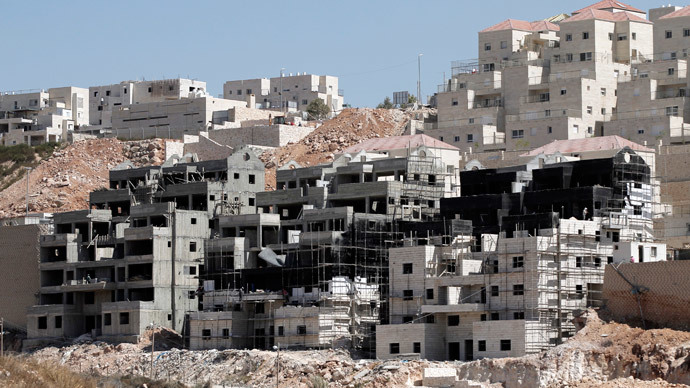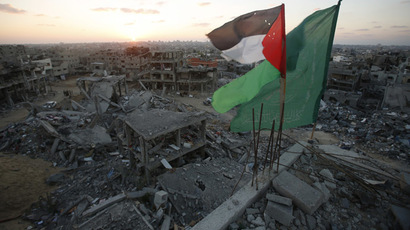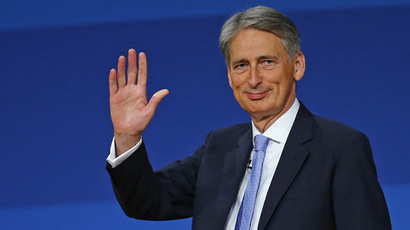Israeli settlements “wicked cocktail” of occupation and illegality says MP

Israel’s settlements in the West Bank are a “wicked cocktail” of occupation and illegality and similar to former apartheid South Africa, a UK MP said. His comments come as British MPs vote to recognize an independent Palestinian state.
“Occupation, annexation, illegality, negligence, complicity: this is a wicked cocktail which brings shame to the government of Israel,” former Tory minister Sir Alan Duncan said on Tuesday. “It would appear that on the West Bank of the Jordan the rule of international law has been shelved.”
“Settlement endorsement, meaning the denial that they are illegal and the support for their consequences, is a form of extremism which we should not tolerate,” he said in a speech to the Royal United Service Institute (RUSI) in London.
He added, “Israeli settlements are the worst, most destructive, aspect of the military occupation, an occupation which has become the longest in modern international relations.”
Duncan was one of 274 MPs who overwhelmingly approved a Commons motion urging the British government to recognize Palestine as a state on Monday night. The symbolic vote came after Sweden announced that it will also recognize a Palestinian state.
Israel quickly condemned the result.
“Premature international recognition sends a troubling message to the Palestinian leadership that they can evade the tough choices that both sides have to make,” Israel’s foreign ministry said in a statement.
However, this vote could exemplify a shift in public opinion in the UK and beyond towards Israel, the UK ambassador to Israel, Matthew Gould, said.
“Israel lost support after this summer’s conflict, and after the series of announcements on settlements,” Gould told Israeli radio. “This parliamentary vote is a sign of the way the wind is blowing, and will continue to blow without any progress towards peace.”
Duncan, a former international development minister, was appointed the Prime Minister’s envoy to Oman and Yemen after leaving government.

He emphasized that every British government since 1967 has declared that the West Bank, East Jerusalem and Gaza were never lawfully part of the State of Israel. However, there are now over half a million settlers living in around 120 settlements and 100 unauthorized outposts in the West Bank and East Jerusalem.
“This illegal construction and habitation is theft, it is annexation, it is a land grab,” he told RUSI delegates.
Settlements should not be mistaken for a few tents or a temporary camp, he argued. Instead, they grow from small outposts to guarded encampments, and then housing estates, followed by entire towns. Now, some Israeli colonies have tens of thousands of inhabitants - 55,000 people live in Modi’in Illit, a settlement midway between Jerusalem and Tel Aviv, for example.
Duncan said he had expressed his concerns about Israel’s settlements in a letter to David Cameron and the then foreign secretary William Hague in June last year.
Highlighting inequality in terms of living standards between Palestinians and Israelis, he said, “Rightful Palestinian citizens are reduced to having nothing while illegal Israeli colonizers get everything: Water, electricity, access, protection; illegal settlers get the lot, the Palestinians next to nothing.”
He also argued that the Israeli government actively encourages illegal settlements, by authorizing, implementing and protecting the “illegal expansion of the borders of Israel.”
“In addition to being illegal, settlement activity is very often violent, nasty, and brutal. Not all, but many settlers are heavily armed and aggressive.”
However, Duncan emphasized that he fully supports Israel’s right to exist within the original borders established at its foundation in 1948.
“Israel is Israel. It is a country. It is a nation. It is a legitimate state and, since 1948, is a full member of the international community, on a par with any other country. Nobody can or should challenge its right to exist.”
But the “illegal” expansion of Israeli territory outside its own borders and into the West Bank by building more and more Israeli settlements is “reprehensible,” he said.
Earlier this month, UK Foreign Secretary Philip Hammond said he “deplores” Israel’s decision to claim more of the occupied West Bank to build 2,610 settlement units in Givat Hamatos in East Jerusalem.
“This is an ill-judged decision which will have serious implications for the possibility of Jerusalem being a shared capital in a future two-state peace agreement and will hinder the process,” Hammond said.
UK-Israeli relations have been tense since Israel launched Operation Protective Edge in July this year. Seven weeks of attacks from both sides followed, in which 2,200 people, many of them children, were killed.














